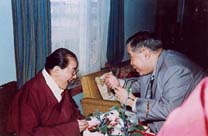|
and it still needs
a lot of resources, the building of this new "Small Perfection Temple"
will then shift away some of its resources. For this reason, I suggested
to Guru Lau that this project should be deferred but he responded by
saying: "The Will-power is incredible." Then the incident of the Macau
centre flashed back in my memory, and so I decided to help out with
it. Two days later, I offered two personal cheques to Guru Lau for the
two temples. I further suggested that the "Small Perfection Temple"
should be renamed as the "Guru's Temple" so that it will have a meaning
for its own existence, and Guru Lau was happy to endorse it. Now that
the Guru's Temple", even though under strong pressures and obstacles,
is coming to its fruition, I have to pay my sincere respects to the
perseverence and pure samaya of the person-in-charge. At the same time,
it further illustrates that the decision made by Guru Lau more than
two years ago was correct.
When Kyabje Dudjom Rinpoche came to Hong Kong for the last time in 1984,
I usually followed along Guru Lau to pay respects to Rinpoche. Guru
Lau asked Rinpoche if he could just focus on one of the three things
- the propagating of the Dharma, the translations of Tibetan scriptures
into Chinese, and his own practice - as he was spreading himself too
thin in doing all three together, particularly when he was getting older.
But Rinpoche's reply was that he should continue on with the three things
as he had done. Then, Guru Lau asked Rinpoche whether it was appropriate
for him to build a Tibetan-style temple in Taiwan, and immediately Rinpoche
used his rosary to do a "mo" and the reply was yes, and Rinpoche even
said that he would bless the sincere wish of Guru Lau so that it would
be fulfilled.
Guru Lau had used up all his energies in order to fulfill the wish of
his Root Teacher, that is, to uphold the Victory Banner in all directions
for the benefit of all sentient beings. To that end, his respects to
Kyabje Dudjom Rinpoche and to the Dharma were beyond doubt. Finally,
Guru Lau asked Rinpoche how old he would be, and Rinpoche was very firm
in saying: "You will be as old as I am". At that time, I did not take
this at heart, but with hindsight, I came to realize that this was most
accurate. Rinpoche was born in 1904 and passed away in 1987; Guru Lau
was born in 1914 and passed away in 1997. What a coincidence!
People usually follow certain guiding principles in treating things
and events. Yet in history, it often proves that dogmatic principles
and "Knowledge" could not help much in times of great changes. The knowledge
we hold basically cannot be transformed into power, unless we integrate
it with our "experiential knowledge" in order to have its effect. Knowledge
and experiential knowledge look very similar, but in reality they are
quite different. We can learn knowledge in books and in schools, but
knowledge itself cannot be automatically transformed into belief systems.
When meeting a difficult situation which needs to be solved immediately,
one's character, exposure, experiences, and an enlightened mind are
indispensable. All these can be known as "experiential knowledge".

Photo 1.52 Guru
lau was making jokes with Kyabje Dudjom Rnipoche II |
Even just "experiential knowledge" is not sufficient because it will
have its opposites. Those who have high "experiential knowledge" soon
find themselves to have many other opponents with lesser “experiential
knowledge”, and this is usually the case when "The tune is pitched
too high for most ordinary people, and only a few will be able to appreciate
it". One needs to integrate both knowledge and experiential knowledge
in strengthening one's beliefs, which can then turn into courage, and
with this courage the dynamic is set in motion to meet all kinds of
opponents and obstacles head on, in order to solve difficult problems.
This I call it "courageous knowledge".
The strengthening of confidence can help a person to act without doubts.
Hence, even though a person has good knowledge of things, but if he
lacks "courageous knowledge", he might feel hesitant and end up in doing
nothing. Finally, one needs to have the sentiments of knowing what should
and should not be done, together with the right decision as to when
is the best time to act, how to do it in a way as to..CONTINUE
..
|
